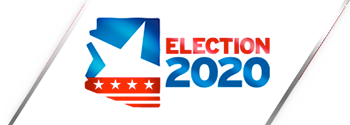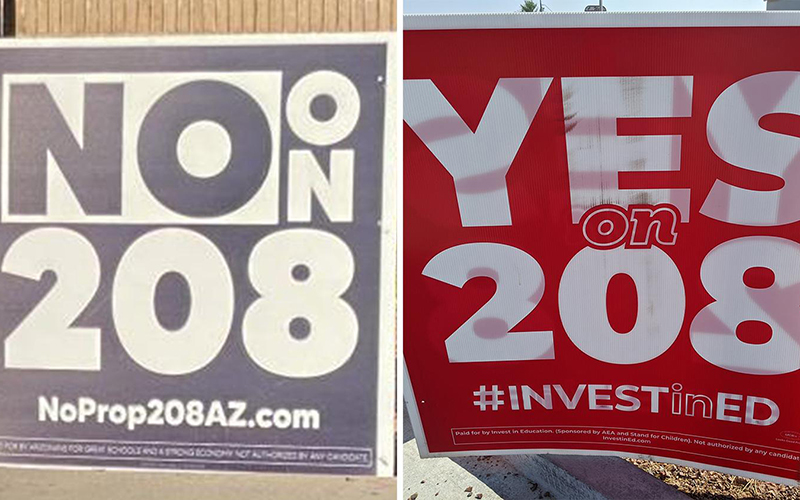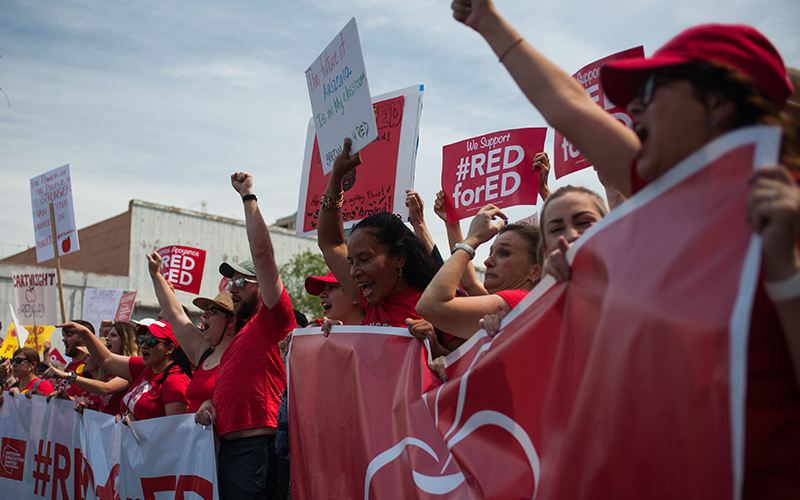Proposition 208 on Wednesday held onto its lead, with the majority of Arizonans voting in favor of raising taxes on the wealthy to fund education, according to unofficial election results from the Arizona Secretary of State’s website.
By Wednesday afternoon, the measure had a 52.55% “yes” vote. However, there were thousands of early and provisional ballots still left to count.
State Sen. Lela Alston, D-Phoenix, a former teacher who serves as an at-large member of the Phoenix Union High School District Governing Board, considered it a win and said she was thrilled by the results.
She told Cronkite News on Wednesday that teachers and school support personnel made Proposition 208 a reality.
It “will go a long way in helping us give every child an equal opportunity to learn and be healthy,” Alston said, noting previous attempts to pass voter-approved funds for schools. “I think it will make an absolute positive, remarkable future for our students and our classrooms, and hopefully we’ll go along way in helping us provide for the shortage of teachers that were experiencing now.”
In a historic win, Arizona voters pass Proposition 208! Proposition 208 restores hundreds of millions of dollars in K-12 education funding to solve the teacher shortage crisis, lower class sizes, hire aides and counselors, and expand career and technical education. #InvestinEd pic.twitter.com/tVoOrunzUg
— #INVESTinAZNOW (@investinaznow) November 4, 2020
— AZ Education Assoc. ?? (@ArizonaEA) November 4, 2020
We celebrate Arizona's overwhelming support of teachers, students and educator to pass #Prop208! Without significant investment in our #PublicSchools, there will be no #EnvironmentalJustice! pic.twitter.com/84A7xtTSxu
— ChispaAZ (@ChispaAZ) November 4, 2020
In 2018, Invest in Education campaigned for Proposition 207, which the Arizona Supreme Court struck from the ballot because the initiative petitions used the word percentage “symbol” when they should have said percentage “points” when describing the tax increase.
“The Legislature has failed to adequately fund public education for the last few decades, and thank God we have the citizen’s initiative, otherwise, I believe the Republican-controlled Legislature would continue to inadequately fund public ed,” said state Sen. Rebecca Rios, D-South Phoenix. “It’s a huge victory, and it belongs entirely to teachers and students and their supporters”
Supporters argued that the citizens initiative would help ease the teacher shortage, worsened as the COVID-19 pandemic created new challenges with virtual learning and often brought longer hours for educators, prompting hundreds of teachers to retire early or leave their profession, teachers unions say. The shortage nationwide was estimated at 112,000 in 2018; educators say districts in Arizona were 7,000 teachers short at the start of the 2019-20 school year.
If approved, Proposition 208 would add a 3.5% surtax to the current rate of 4.5% on income exceeding $250,000 for single earners or $500,000 for couples – bringing Arizona’s highest income tax bracket to 8%. Fifty percent of revenue would be dedicated to hiring teachers and classroom support, 25% to hiring student support services, 10% to providing mentoring and retention programming for new teachers, 12% to the Career Training and Workforce Fund, and 3% to the Arizona Teachers Academy Fund.
The proposition would allow districts to hire more teachers and raise salaries of a workforce that is at high risk during the pandemic in a state that consistently ranks low on teacher pay, school funding and student performance.
U.S. Rep. Ruben Gallego, D-Arizona, also applauded Proposition 208’s likely passage.
“Our students need and deserve this. Our teachers need and deserve this. And Arizona’s economy and future will be better for it. It’s long past time to properly fund our school system,” he said in a statement to Cronkite News.
The proposition follows the Red for Ed movement, which staged teacher walkouts in 2018 to press a series of demands, including a 20% raise for teachers. In response, Gov. Doug Ducey agreed to incremental pay hikes and additional school funding. But in response to the Great Recession, Arizona cut funding for K-12 public schools more deeply from 2008 to 2015 than any other state – and those dollars have not been fully restored, according to the Arizona Republic.
Opponents argue that small businesses are just beginning to recover from the economic repercussions of the COVID-19 pandemic and this is not the time for tax increases. Supporters argue that few small businesses would be subject to the surtax, and that the Legislature has failed Arizona schoolchildren for years.
Invest in Education, also known as Yes on 208, is leading the campaign in support of the proposition, and Arizonans for Great Schools and a Strong Economy is leading the opposing campaign.
Issues that matter are on the ballot. Here are some important questions to vote on this year:
AZ:
Yes on Prop 208
CO:Yes on Prop 118
CA:Yes on Prop 15, 16, 21,
No on Prop 22
FL:Yes on Amd 2
OR:Yes on Measure 107https://t.co/hDx2sbl5AI
— Bernie Sanders (@BernieSanders) October 16, 2020
Supporters include U.S. Sen. Bernie Sanders, of Vermont, U.S. Rep. Ruben Gallego, D-Phoenix, the Arizona AFL-CIO and the Maricopa County Democratic Party.
“Let’s address the decades of cuts to education funding in Arizona and invest in our schools, teachers, and kids,” Sanders said in a post on Medium.
“Invest in Ed will put $940 million in new funding into Arizona classrooms each year – funding the Legislature can’t touch,” Gallego said in a statement to Cronkite News. “Arizona’s students and teachers need this money. Our teacher shortage is worsening, and we have some of the largest class sizes in the nation.
“Not only that, but an investment in education is a long term investment in Arizona’s economy and future. Our school system has too long been underfunded, and Prop 208 will help remedy that.”
Prop 208 would be terrible for Arizona & puts us one step closer to becoming California. It would move us from the 11th lowest to the 10th highest income-tax rate, & small businesses would bear a huge burden of the tax, stifling our economy & killing jobs. https://t.co/0Mnl8XkhXA
— Debbie Lesko (@DebbieLesko) October 20, 2020
Opponents include Gov. Doug Ducey, U.S. Rep. Andy Biggs, R-Chandler, the Arizona Small Business Association and Americans for Tax Reform.
“Right now, Arizona’s small businesses are recovering from the economic harm done by the COVID pandemic,” Ducey said. “This tax increase is estimated to cost taxpayers around $1 billion annually. That’s a whopping amount, especially considering that our economy is recovering from recession and high unemployment.”
 Want more on the 2020 elections? Cronkite News, Arizona PBS and Indian Country Today have teamed up to bring you comprehensive election coverage. Click here for more.
Want more on the 2020 elections? Cronkite News, Arizona PBS and Indian Country Today have teamed up to bring you comprehensive election coverage. Click here for more.


